As India gears up for the Union Budget 2024-25, the technology and IT industries are urging the government to prioritize investments in critical areas such as digital infrastructure, cybersecurity, and emerging technologies. The sector is also seeking increased funds for R&D and incentives for startups to drive innovation in AI, blockchain, and IoT, alongside a push for improved cybersecurity.
Read the budget expectations in detail:
Sajid Malik, Chairman and Managing Director, Genesys International
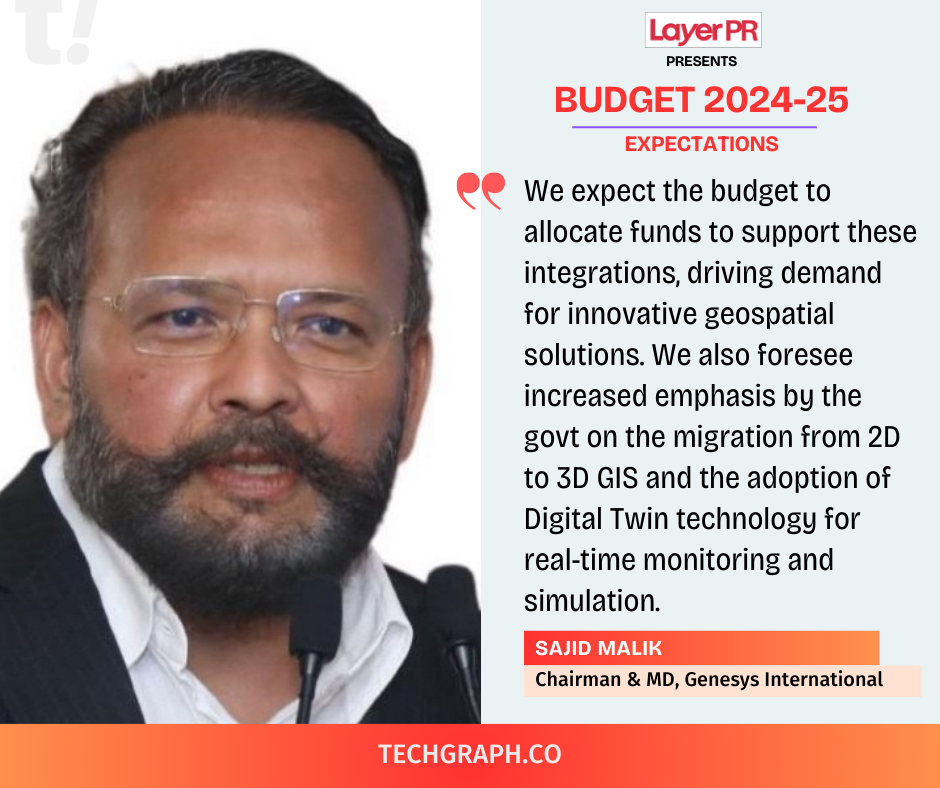
As we approach the 2024 Union budget, we expect continued government support and investment to drive the growth of the Geospatial Industry in India. The adoption of GIS (Geographic Information System) technology has been transformative across various sectors, including urban planning, telecom, disaster management, and large-scale mapping initiatives for land titling, agriculture, and logistics.
We anticipate the budget will focus on further accelerating digital transformation by leveraging GIS for spatial analysis, data visualization, and decision-making processes. The integration of GIS with emerging technologies such as artificial intelligence, machine learning, and the Internet of Things has already enhanced existing capabilities, enabling real-time data analysis, location-based services, and predictive analytics.
We expect the budget to allocate funds to support these integrations, driving demand for innovative geospatial solutions. We also foresee increased emphasis by the government on the migration from 2D to 3D GIS and the adoption of Digital Twin technology for real-time monitoring and simulation. The budget is also expected to promote cloud-based geospatial solutions to revolutionize data storage, processing, and collaboration, and make geospatial technology more accessible and cost-effective.
Government initiatives like Digital India and the Smart Cities Mission have been crucial for the geospatial industry, and we hope the budget will continue to support these programs, fostering a conducive environment for growth. By enhancing its investments in the sector, the budget can ensure the continued expansion and positive impact of the geospatial industry in India.
Anuj Gupta, Enterprise and Sales Lead, AutoVRse

Technology developments are anticipated to receive a portion of the proposed budget for 2024 to promote development and industry development in the IT sector. It will become essential to invest in cutting-edge technologies like blockchain, IoT, and AI. By boosting output, sustainability, and efficiency, these advances ought to improve India’s standing in the global IT market.
It is essential to comply with international digitization and sustainability criteria. By addressing present issues, this alignment can establish India as a pioneer in the tech-driven, effective logistics industry. The two most important tactics to accomplish these objectives will be to improve digital infrastructure and offer incentives for green logistics. Such programs promote sustained growth in addition to promoting innovation.
To fulfill the demands of a changing ICT ecosystem, the budget should also prioritize training and upskilling the workforce. Other areas where the budget can have a big influence are bolstering cybersecurity measures and helping businesses with finance and incubation facilities. In general, advancing India’s IT sector towards global leadership will require an innovative budget that embraces sustainability and technology.
Siva Balakrishnan, Founder and CEO, Vserve
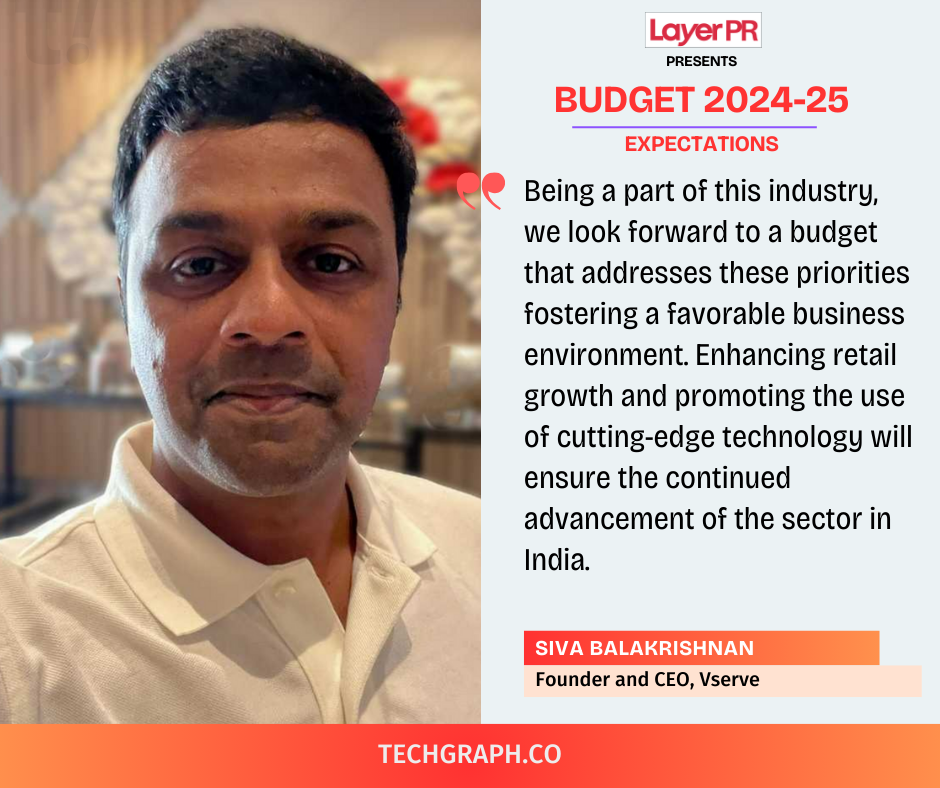
As Budget 2024 approaches, I’m eagerly anticipating measures that will support the growth and stability of the e-commerce sector. One critical expectation is for the government to take proactive steps to manage inflation. By doing so, they can safeguard customer purchasing power and bolster retail expansion.
Improving the process of royalty payments through technology is also crucial. Many Indian e-commerce firms rely on advanced foreign technologies to enhance their operations. Simplifying royalty payments can encourage the adoption of these technologies, boosting efficiency and competitiveness.
Being a part of this industry, we look forward to a budget that addresses these priorities fostering a favorable business environment. Enhancing retail growth and promoting the use of cutting-edge technology will ensure the continued advancement of the sector in India.
This is the first Budget after the election of the Modi Government, and I hope it will favor the e-commerce industry. While the government has worked towards building e-commerce infrastructure to provide equal opportunities in previous tenures, there is still more to be done. Budgetary support for the growth of the Open Network for Digital Commerce (ONDC) would be a great starting point.
Investing in cybersecurity to protect e-commerce platforms and consumers from fraud and data breaches is another crucial area. I would love to see incentives for environmentally friendly practices, such as sustainable packaging and eco-friendly logistics, including the use of renewable energy in warehouses and delivery vehicles.
Piyush Goel, Founder & CEO, Beyond Key

The 2024 budget in the tech sector anticipates key reforms that would streamline operations and boost growth towards a tech-savvy future. One of the key expectations is that the legislation governing Mutual Agreement Processes (MAP) and Advanced Pricing Agreements (APA) will be simplified. These regulations are essential for technology businesses operating globally to ensure affordable rates for cross-border transactions and resolve tax issues.
In addition, there may be pressure to make the way royalties are paid more transparent and easier. Indian businesses that produce and distribute overseas technology products and services regularly depend on technological skills and information from abroad. Simplifying royalty payment policies could not only ease the administrative burden but also encourage the adoption of advanced technologies, and increase productivity and innovation in the field. Tech startups anticipate a Rs 1 trillion deeptech fund and increased investment in cutting-edge research for global commercialization.
All in all, the technology zone looks forward to a budget that addresses these critical issues, fosters an exceptionally conducive business environment, and aids the continued growth and competitiveness of India’s technology groups in the international market.
Anushita S P KarunaKaran, CEO & Co-Founder, LawyerDesk

Enhanced budget allocation for developing and maintaining digital infrastructure in the legal sector is crucial. Improved digital infrastructure ensures better access to legal services and the smooth operation of legal tech companies. We urge the government to introduce tax breaks and incentives for legal tech startups, encouraging innovation and investment.
Government grants and funding for legal tech R&D are essential for creating advanced solutions that enhance service efficiency. Promoting public-private partnerships will drive legal tech adoption in the public sector, improving access to justice.
We advocate for budget allocation for legal tech education and training programs for law professionals and students to ensure smoother integration of new technologies. Financial support for developing multi-lingual capabilities in legal tech applications will ensure broader accessibility. Funding for integrating AI and machine learning in legal tech will enhance efficiency and reduce the judiciary’s burden. Addressing these expectations in the Union Budget 2024-25 will significantly advance the legal tech industry and improve access to justice in India.
Bharath Aitha, Vice President of Marketing, eInfochips (An Arrow Company)

In the face of global economic uncertainties, the upcoming budget represents a pivotal opportunity for India to fortify its economic resilience by propelling India’s technological leadership. At eInfochips, we advocate for a budget that fosters robust public-private partnerships and bridges the gap between academia and industry. This will catalyze cutting-edge research and development, positioning India at the forefront of global innovation.
Additionally, substantial investments in skilling and reskilling our workforce are crucial as mastering technologies such as AI, machine learning, and cybersecurity becomes essential for maintaining competitive advantage. Lastly, incentivizing innovation through tax breaks and grants for R&D will propel homegrown technology and attract international investments, nurturing a thriving tech ecosystem.
Dilip Modi, Founder & CEO, Spice Money
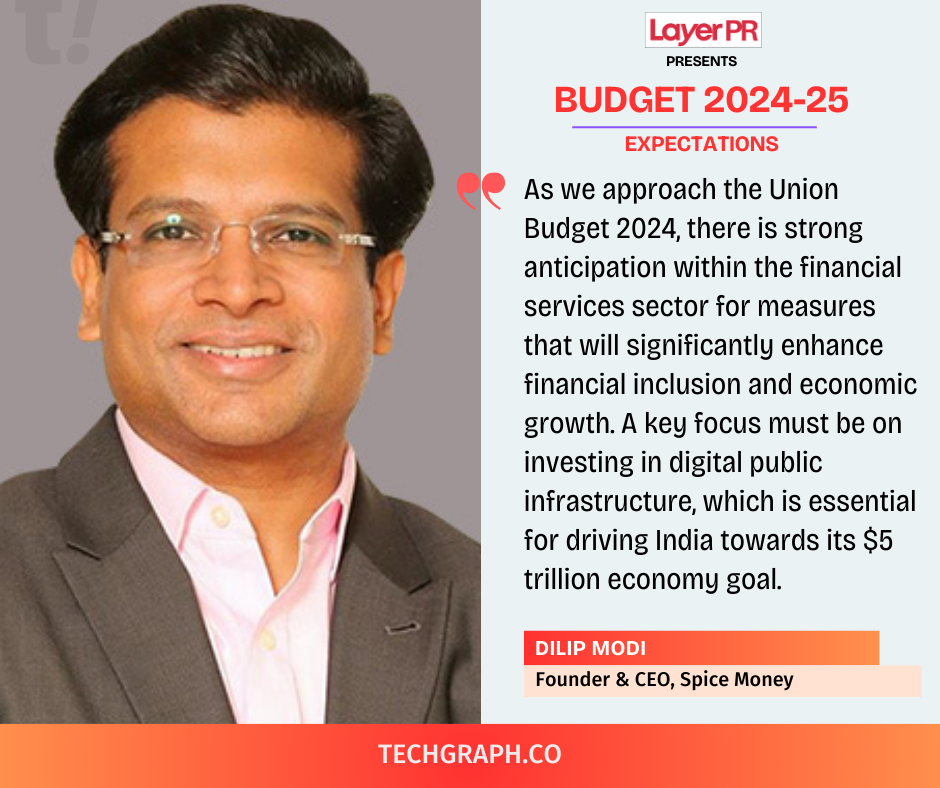
As we approach the Union Budget 2024, there is strong anticipation within the financial services sector for measures that will significantly enhance financial inclusion and economic growth. A key focus must be on investing in digital public infrastructure, which is essential for driving India towards its $5 trillion economy goal.
Digital public infrastructure has been instrumental in driving the exponential growth of digital payments in India, with an approximately 90-fold increase over the past 12 years, highlighting the nation’s digital transformation. This remarkable surge underscores the need for robust security measures to prevent digital payment fraud. We commend the recent initiatives to enhance security, such as the announcement of a digital intelligence platform. It is essential to continue focusing on enhancing security and safety measures to support sustained growth and consumer confidence in digital payments.
To maintain the growth of the payment ecosystem, it is essential to empower fintech companies that provide last-mile services. These companies are vital in bridging the credit gap, especially for SMEs and Nanopreneurs, thereby driving entrepreneurial growth and job creation. By making financial products accessible to more people, these fintech firms play a critical role in furthering financial inclusion.
Additionally, exempting GST on services offered through Business Correspondent outlets would alleviate tax burdens and make it more feasible to extend financial services to rural and remote areas. This tax relief would lower operational costs and encourage greater outreach, fostering financial empowerment at the grassroots level. This exemption addresses current challenges in invoicing due to GST, crucial for enabling nanopreneurs’ access to formal credit and promoting economic stability and growth.
Furthermore, the recognition of Self-Regulatory Organizations (SROs) in the fintech sector represents a positive step towards better regulatory alignment and communication. This will help maintain a balance between innovation and compliance, ensuring that fintech companies can continue to innovate while adhering to regulatory standards. Strengthening this regulatory dialogue will facilitate smoother interactions between fintechs and regulators, fostering a conducive environment for sustainable growth and innovation in the financial services sector.
Mahesh Ramamoorthy, Chief Information Officer, YES BANK
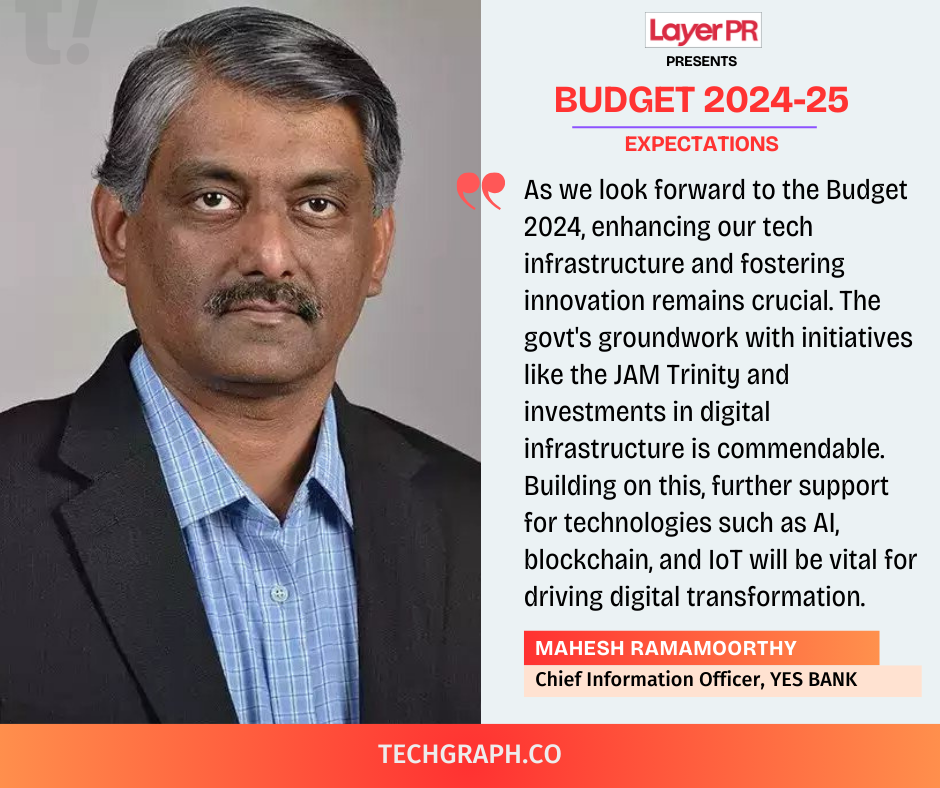
As we look forward to the Union Budget 2024, enhancing our technology infrastructure and fostering innovation remains crucial. The government’s groundwork with initiatives like the JAM Trinity and investments in digital infrastructure is commendable. Building on this, further support for technologies such as AI, blockchain, and IoT will be vital for driving digital transformation and improving efficiency. Establishing a continuum of cybersecurity measures is essential to improving an organization’s security posture. Investments in advanced threat intelligence and robust encryption will protect our digital assets and build user trust. Additionally, improving data privacy and governance will ensure compliance with global standards and safeguard user information.
Promoting a culture of continuous learning and innovation is key to attracting and retaining top tech talent. The government can facilitate this by providing policy support, funding for technology initiatives, and creating an enabling environment for innovation. The private sector, including institutions like YES BANK, can then provide access to advanced tools and reskilling programs to drive sustained growth and innovation. At YES BANK, we are committed to leveraging these advancements to support our customers and drive economic growth. We look forward to the government’s continued support in these critical areas to achieve a technologically advanced and sustainable future for India.
Sayandeb Banerjee, Cofounder and CEO, MathCo

India is known to be the most preferred destination for Global capability centers. A recent report highlighted that India has over 50% of GCCs and most of the GCCs concentrate their efforts on driving AI/ ML and Data Analytics. This makes for a perfect playground for deep tech startups to innovate locally, tackle global challenges head-on, and build IPR in India.
Given India’s strength that lies in its young, highly capable, and skilled population spread across Tier 1, Tier 2, and Tier 3 cities, we are well-positioned to emerge as an innovative and frugal solutions hub for large global enterprises. Amidst this dynamic landscape, the National Deep Tech Startup Policy is a welcome step for the startup ecosystem.
Chetan Jain, Founding Executive Director, and Managing Director, Inspira Enterprise
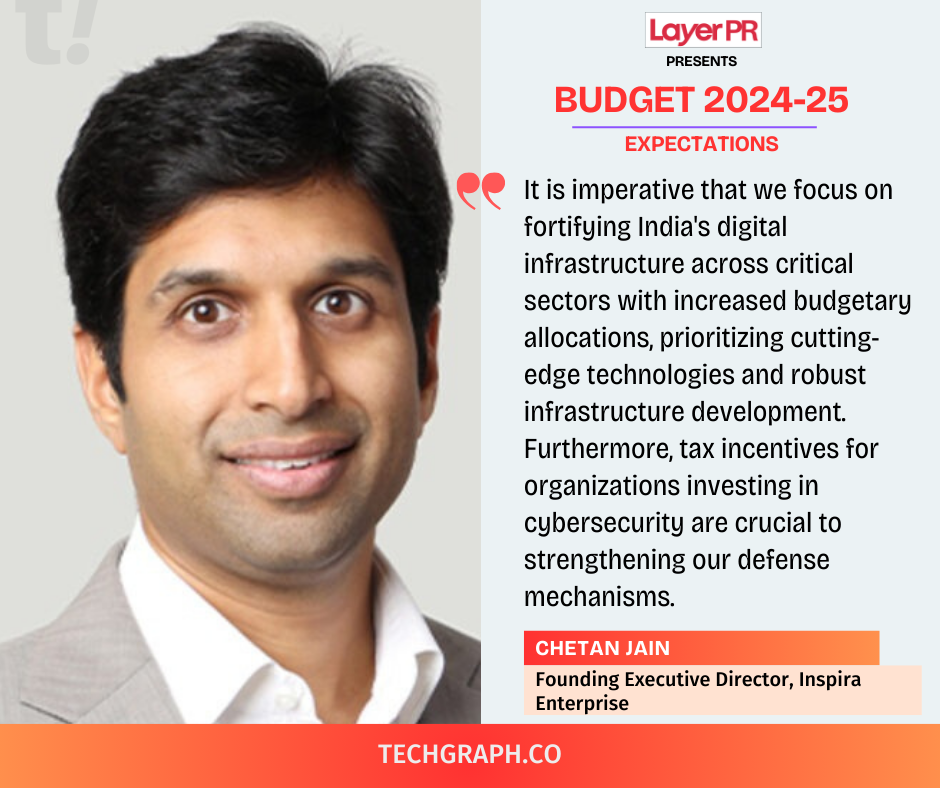
As we approach the Union Budget announcement, it is imperative that we focus on fortifying India’s digital infrastructure across critical sectors with increased budgetary allocations, prioritizing cutting-edge technologies and robust infrastructure development.
In alignment with the Digital Personal Data Protection Act (DPDPA), this budget should promote the design and implementation of comprehensive cybersecurity programs, reinforcing the legal framework for data privacy.
Furthermore, tax incentives for organizations investing in cybersecurity are crucial to strengthening our defense mechanisms. Additionally, significant support is needed to cultivate cybersecurity talent through targeted skill development initiatives. The budget should also enable further impetus with policies that support innovation in Generative AI (GenAI), particularly in transforming the cybersecurity landscape.
Uma Shankar Patro, Senior VP of Finance, InfoVision
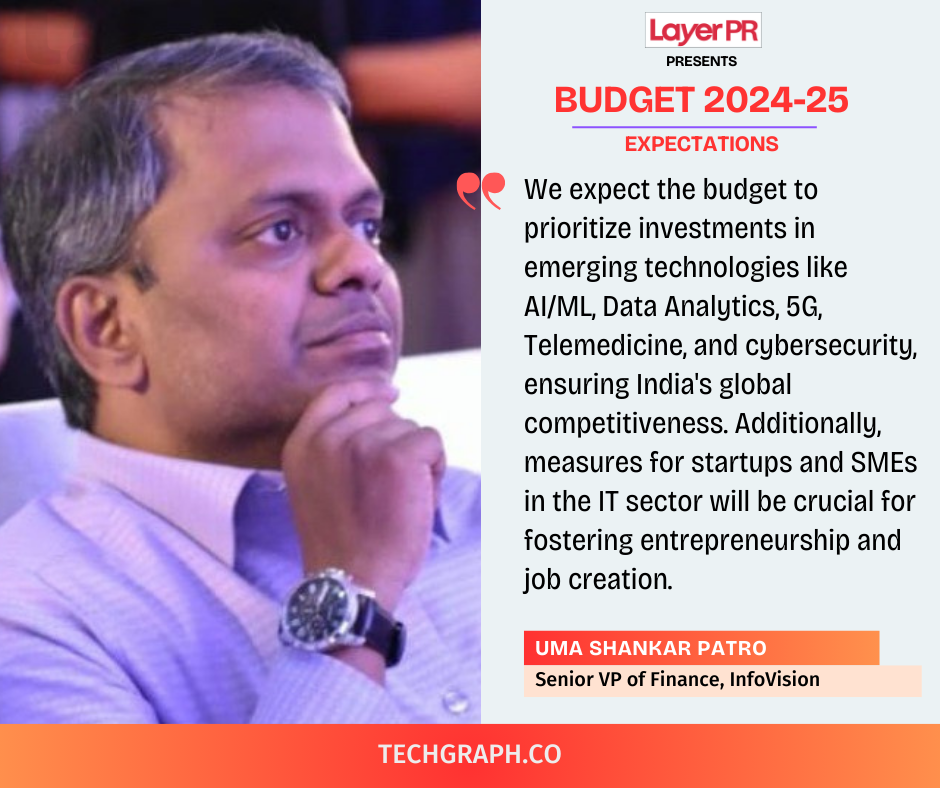
At InfoVision, we eagerly anticipate Budget 2024-25, hoping for transformative policies that bolster India’s digital economy. As a key player in the IT sector, we look forward to initiatives that foster innovation, strengthen digital infrastructure, and promote skill development.
We expect the budget to prioritize investments in emerging technologies like AI/ML, Data Analytics, 5G, Telemedicine, and cybersecurity, ensuring India’s global competitiveness. Additionally, measures for startups and SMEs in the IT sector will be crucial for fostering entrepreneurship and job creation. Embracing innovation, inclusivity, and sustainability, the upcoming budget can propel India towards becoming a global leader in the digital age.
Punit Sindhwani, Founder & CEO, PAXCOM

The IT sector looks forward to the upcoming budget, seeking enhanced R&D incentives to boost innovation and global competitiveness. Expanding the PLI scheme is vital for driving domestic manufacturing. Addressing the Angel Tax by raising investment thresholds is crucial for supporting startups.
Greater funding for STEM education, upskilling programs, and expanded visa regimes is imperative for accessing skilled talent. Investing in digital infrastructure is essential for adopting new technologies. Simplifying tax laws and digitizing compliance will create a more business-friendly environment. We are optimistic that the government will support these key areas to foster IT industry growth.




